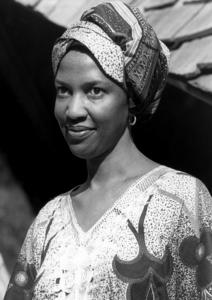Sister Bowman's presence, energy recalled 25 years after her death
CANTON, Miss. (CNS) -- There is no doubt that Sister Thea Bowman possessed a presence.
Many of those who knew her well speak of how she enveloped those around her with love, encouragement and positive energy, no matter if they were a lifelong friend or someone she just met.
March 30 marked 25 years since she died in the Canton home where she grew up.
A Franciscan Sister of Perpetual Adoration, she was a trailblazer in almost every role -- first African-American religious sister from Canton, first to head an office of intercultural awareness, first African-American woman to address the U.S. Conference of Catholic Bishops, but to those who grew up under her tutelage in Canton, she was a singular inspiration.
"Calling her an encourager -- that's not even a strong enough word," said Cornelia Johnson, a student of Sister Bowman. "She was that person who went beyond seeing the good in every person. She helped that good come out more," Johnson added.
Prior to the anniversary of her death, the editors at the Mississippi Catholic, newspaper of the Jackson Diocese, asked some who knew her to reflect on her legacy and her call to evangelization.
Bertha Bowman was born in Yazoo City, the granddaughter of slaves and the daughter of a doctor and a teacher. She attended Canton Holy Child Jesus School, and at age 8 decided she wanted to become a Catholic. She knew by her early teenage years that she was called to consecrated life.
She studied at Viterbo College in La Crosse, Wisconsin, while preparing to enter the Franciscan Sisters of Perpetual Adoration. She went on to study at The Catholic University of America. She returned to Canton to teach and inspire the people in her community.
"I was proud to have her be from Canton," said former student Myrtle Jean Otto. Otto said she not only demanded excellence from her students, she wanted them to think beyond traditional roles.
"She was a wonderful person to be around because you learned a lot from her. She wanted you to go to college and learn," said Otto. "If you were not college material, she would encourage you to get a good trade."
Both Otto and Johnson said that Sister Bowman was from Canton was a huge part of why so many looked up to her, but they also both spoke of her compassion.
"She had more of an impact because she was black, and she let us know we could do anything we wanted to do," said Otto.
This influence was especially important as Canton, and the nation, struggled after the civil rights movement to define new roles for black people in business, society and within the Catholic Church.
Sister Bowman's education and background led her to reflect upon the tensions of race and culture within the Catholic Church. She became a unique evangelizer. She did not advocate for a uniform worship including parts of different cultures. She called on church leadership to recognize the value of all cultural contributions within the church, to let people express their faith within their own cultural context.
Sister Bowman personally experienced that struggle, working to unite her black cultural background, with its characteristic music, storytelling, food and expressions, with the staid structures of the church.
Bishop Joseph B. Brunini, head of the Jackson Diocese at the time, invited her to lead the diocesan Office of Intercultural Awareness, but she didn't stop there. She also taught at several Catholic high schools and colleges and was a faculty member of the Institute of Black Catholic Studies at Xavier University in New Orleans.
She took her message across the nation, speaking at church gatherings and conventions. Music was especially important to her. She would gather or bring a choir with her and often burst into song during her presentations.
She invited church leaders to her hometown and immersed them in its culture.
"She would call my mama and say, I have a guest coming, will you cook for me?" explained Otto. "And my mother would fix a meal for her, fried chicken with rice and gravy or gourmet biscuits or cornbread," said Otto.
Sister Bowman got breast cancer at the height of her career. She continued her grueling travel schedule, even as the disease took her hair, her ability to speak and her strength as it spread to her bones.
When Sister Bowman spoke at the U.S. bishops' meeting in June 1989, less than a year before her death, she was blunt. She told the bishops that people told her black expressions of music and worship were "un-Catholic."
Sister Bowman challenged that notion, pointing out that the church universal included people of all races and cultures and she challenged the bishops to find ways to consult those of other cultures when making decisions. She told them they were obligated to better understand and integrate not just black Catholics, but people of all cultural backgrounds.
Catholic News Service reported that her remarks "brought tears to the eyes of many bishops and observers." She also sang to them and, at the end, had them all link hands and join her in singing "We Shall Overcome."
Otto said one of Sister Bowman's talents was her ability to relate across social, racial and educational boundaries.
"She could speak to everyone on their level, whether you had a college degree or were just a poor person," said Otto. She and Johnson both said Sister Bowman had an uncanny ability to connect to people and challenge them.
"Because of her, I grew to be the woman I think God wanted me to be," said Johnson.



















